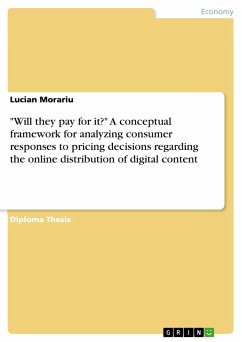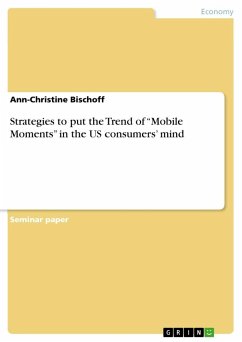
"Will they pay for it?" A conceptual framework for analyzing consumer responses to pricing decisions regarding the online distribution of digital content

PAYBACK Punkte
0 °P sammeln!
Diploma Thesis from the year 2007 in the subject Business economics - Offline Marketing and Online Marketing, grade: 1,7, University of Mannheim (Lehrstuhl für Allgemeine BWL und Marketing I), language: English, abstract: No other electronic medium - in fact, no other medium at all - has become a mass medium as fast as the Internet did. At the beginning of 2008, there were more than 1.3 Billion users online, which accounts for roughly one fifth of the world population. Historically, the Internet has been conceptualized as a means of communication. Realizing its potential, however, it was soon...
Diploma Thesis from the year 2007 in the subject Business economics - Offline Marketing and Online Marketing, grade: 1,7, University of Mannheim (Lehrstuhl für Allgemeine BWL und Marketing I), language: English, abstract: No other electronic medium - in fact, no other medium at all - has become a mass medium as fast as the Internet did. At the beginning of 2008, there were more than 1.3 Billion users online, which accounts for roughly one fifth of the world population. Historically, the Internet has been conceptualized as a means of communication. Realizing its potential, however, it was soon used for commercial purposes as well. In addition to that, there is a third major area that has long been a major pillar of Internet usage: content. Much of the tremendous growth of the Internet over the past decade can be explained by the fact that, apart from fees for the usage of bandwith, content and other services on the Internet have usually been offered for free, typically financed byrevenues from online advertising. Faced with the burst of the Internet bubble and the sales from Internet advertising breaking away, however, online companies started looking for alternative ways of generating revenues. One of the most obvious options was to start charging consumers directly for the content offered to them, which was a rather significant paradigm shift.The picture emerging today is twofold: On the one hand, online consumers who have grown accustomed to free services and content find the prospect of having to pay for those rather appalling. On the other hand, there is evidence that there is at least some degree of willingnes to pay for digital content among online consumers. These controversial findings show that there is still a lot to be learned about business models, pricing strategies, and consumer attitudes towards paid content. It seems as if online consumers are definitely willing to pay for content under certain circumstances, yet there is much confusion about what these circumstances are exactly. As a result, there is apparently a great need for understanding online consumers' behavior and attitudes better in order to make more accurate decisions about when and how to put a price tag on digital content online. This book intends to bridge this gap. However, the focus of is not on determining the optimal pricing strategy for providers of digital content. Instead, by adopting a consumer behavior perspective, it develops a conceptual framework that identifies the main factors influencing consumers' willingness to pay for digital content in an online context and thus deepens the understanding of how a company's specific pricing decisions affect those factors.













